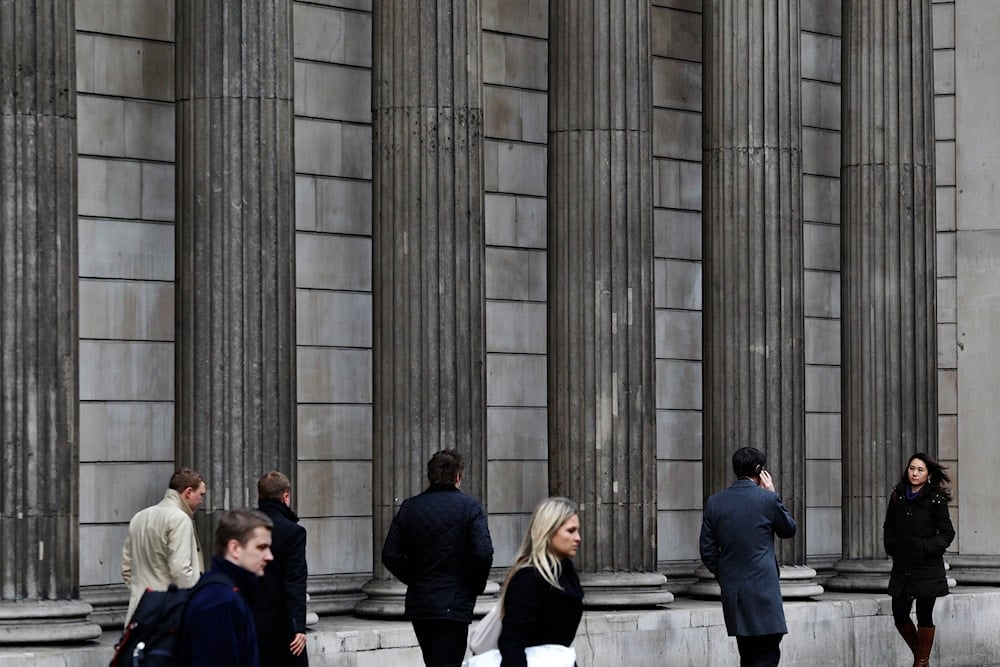Wealthy Brits avoiding more tax than previously thought: Watchdog
A new report reveals the potential underestimation of wealthy tax evasion in the UK, urging ministers to take stronger action.
-

People walk outside the Bank of England, in London's City financial district, on February 14, 2012. (AP)
The UK’s National Audit Office (NAO) has raised concerns on Thursday that wealthy individuals may be avoiding more tax than previously estimated following a sharp decline in the number of penalties issued by HM Revenue and Customs (HMRC) to high-net-worth taxpayers.
In a new report, the NAO urged ministers to intensify efforts to recover billions of pounds in unpaid taxes, stating that while HMRC has improved its collection from wealthy individuals, signs of deeper tax avoidance remain.
According to the report, the number of penalties imposed on wealthy individuals has fallen significantly, from 2,153 in 2018–19 to just 456 in 2023–24. The total value of penalties also declined from £16.2 million to £5.8 million over the same period.
Meanwhile, the number of individuals classified as wealthy, defined as earning more than £200,000 annually or holding over £2 million in assets, rose from 700,000 in 2019–20 to 850,000 in 2023–24.
The NAO noted that HMRC’s compliance yield from wealthy taxpayers more than doubled from £2.2 billion in 2019–20 to £5.2 billion in 2023–24. However, this figure exceeds HMRC’s official "wealthy tax gap" estimate of £1.9 billion, suggesting that actual non-compliance could be significantly higher.
Gareth Davies, head of the NAO, said, "HMRC deserves credit for greatly increasing the additional tax revenue its compliance work has brought in from wealthy taxpayers, however, this may indicate that levels of non-compliance are higher than previously estimated."
He also called for greater transparency to boost public confidence in the fairness of the tax system.
Reeves faces budget pressures and tax reforms
UK Chancellor Rachel Reeves is under increasing pressure to raise additional revenue ahead of the autumn budget. Critics, including former No. 10 Economic Advisor Nick Williams, have questioned the credibility of current spending plans, warning that tax increases are inevitable.
“The bottom line is that taxes will have to go up,” Williams wrote in The Times, calling for a reassessment of Labour’s fiscal strategy.
Labour has already proposed several tax reforms targeting the wealthy, including scrapping the non-dom tax status, raising capital gains tax, and introducing VAT on private school fees. These measures are aimed at easing the strain on public finances without cutting essential services.
While free-market critics argue that such policies have led to an exodus of millionaires, Labour’s left-wing supporters continue to urge more aggressive taxation of the rich instead of placing the burden on lower-income groups.
Wealthy individuals contributed £119 billion in personal taxes in 2023–24, accounting for 25% of the UK’s total personal tax receipts. HMRC now has a dedicated compliance team of 910 staff focused on monitoring this group.
Although a unit targeting those with assets over £10 million was disbanded in 2017, the government allocated new funding in the autumn budget to tackle offshore non-compliance and tax fraud.
An HMRC spokesperson stated, "It’s our duty to ensure everyone pays the right tax under the law, regardless of wealth or status. The government is delivering the most ambitious ever package to close the tax gap and bring in an extra £7.5 billion for public services per year by 2029–30."

 3 Min Read
3 Min Read










